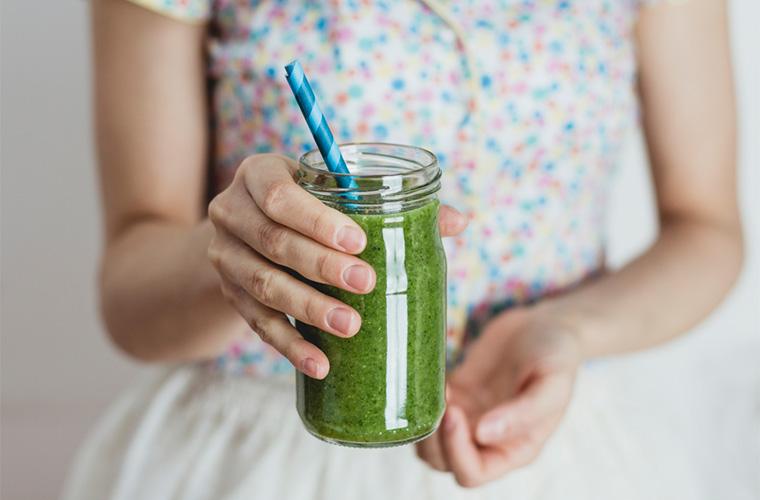Now that golden milk is enjoying its moment in the sun, many wellness influencers have moved on to another good-for-you beverage: blue algae lattes. Heralded by many as a superfood, spirulina has taken over cafe menus (hello, unicorn latte) as the smoothie booster du jour. Other forms of algae, like chlorella or E3's proprietary strain Blue Majik, are riding the wave of spirulina's popularity.
But just as doctors were singing its praises, the buzzy ingredient was making headlines for another reason: Algae was called out as the reason why people became violently ill after eating Soylent bars. Um, yikes.
So what's the deal—is it safe to sip your oh-so-Instagrammable blue latte with impunity? To find out, I tapped Global Healing Center founder Edward Group, DC and NP, who spent five years researching and studying various types of algae.
Here, Dr. Group offers up everything you need to know about the blue-green star of the healthy food world—and how to safely add it to your diet.

Why algae is trending right now
According to Dr. Group, there are literally thousands of different types of algae, but three are by far the most popular: spirulina (the main ingredient in those strikingly blue lattes), AFA, and chlorella. First, the good news on The Big Three: "They all have very high concentrations of nutrients and vitamins, including protein, iron, potassium, zinc, calcium, and B vitamins."

{{post.sponsorText}}
Also, according to Dr. Group, 60 percent of algae is made up of protein. Soy has a comparable amount, but a major reason a growing number of food manufacturers are favoring algae is that all those added nutrients come with the protein. It's like buying a pair of leggings, and finding out at checkout that you get a sports bra and tank for free.
Spirulina, AFA, and chlorella also serve as a magnet for toxins in the body—and they do an excellent job of flushing them out. Clearly algae is full of health benefits. But keep in mind: Dr. Group's advice to add more to your diet comes with a major warning.

Beware of shady spirulina
"[My team and I] tested spirulina, AFA, and chlorella from all over the world and found that the majority of them were contaminated with different types of metals such as arsenic, aluminum, mercury, or lead," Dr. Group reveals.
Why the scary levels of contamination? Blame the manufacturers. "A lot of companies use fillers, whether they're selling the algae in capsules or using it as a food ingredient—like a flour; it's not the algae itself that's toxic, but what it's being mixed with," Dr. Group explains. "When you start mixing it with genetically modified maltodextrin, soy protein isolates, or other compounds, a lot of times that can cause contamination."
Considering one of the core ingredients in those Soylent bars—besides algae flour—is soy isolate, it sounds like he may be onto something.
Despite the contamination risks, Dr. Group notes that "algae is one of the world's most nutrient-dense foods—I would never want to deter someone from taking it." The key is paying close attention to the source.

How to pick a safe algae
To make sure the smoothie booster is clean and pure, our expert advises sticking with companies that are organic, non-GMO, and gluten-free—which will limit cross-contamination a lot.
He also says to check out brands' websites to see if they call out where their algae is sourced from and whether any testing has been done to verify that it's clean. If they're not touting that information, be wary.
And if you're eating out? Your server should be knowledgable about what's being served. If he or she can't speak intelligently about it, buying premium goods might not be a priority for the cafe. This may be one instance where fully becoming a Portlandia character and knowing as much as you can about the path from ocean to table is worth the effort (and the awkwardness).
While you're adding more superfoods to your diet, you definitely don't want to leave out the seven on this list. And while it won't make you sick, chia seeds (that other buzzy ingredient) might be the cause of your bloating.
Loading More Posts...